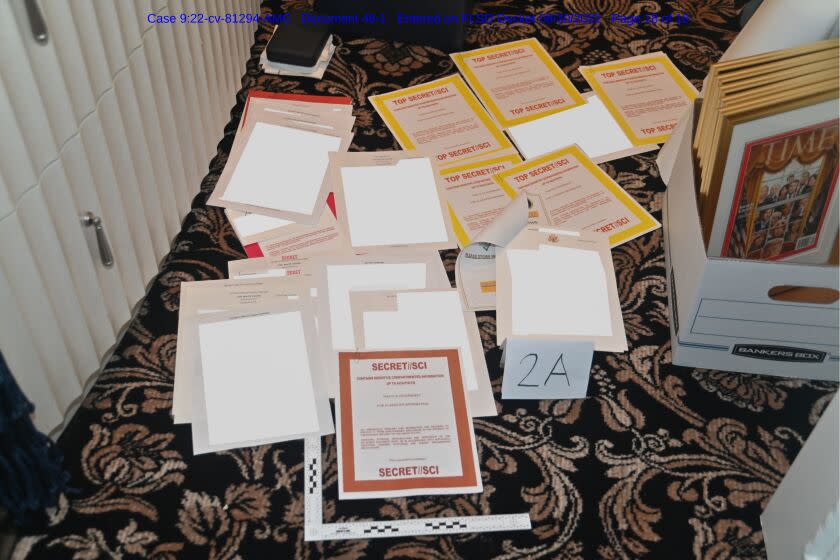Trump's storage of documents was no 'cause for alarm' by Justice Department, his lawyers say

- Oops!Something went wrong.Please try again later.
The storage of sensitive government documents at former President Trump's Mar-a-Lago estate in Palm Beach, Fla., "should have never been cause for alarm," his lawyers argued in a court filing Wednesday.
The former president is pushing for the appointment of a third-party special master to review hundreds of classified documents and other materials taken from his home Aug. 8, with his legal team casting the court-approved search of his property as an unnecessary escalation of the "standard give-and-take between former Presidents and [the National Archives] regarding Presidential library contents."
"The purported justification for the initiation of this criminal probe was the alleged discovery of sensitive information contained within the 15 boxes of Presidential records. But this 'discovery' was to be fully anticipated given the very nature of Presidential records," the filing states. "Simply put, the notion that Presidential records would contain sensitive information should have never been cause for alarm."
FBI agents removed more than 100 documents containing classified information — including some marked top secret and meant to be available only in special government facilities — from Trump’s Mar-a-Lago estate, along with 20 boxes of materials.
Trump's lawyers have argued that a court-appointed special master is necessary to ensure the Justice Department returns any private or privileged documents seized during the search, and said in their filing Wednesday that the department will "leak and publicize its probe." In their Aug. 22 request, the former president's attorneys asked the judge to prevent the Justice Department from reviewing the items until a third party looked at them.
U.S. District Judge Aileen Cannon of the Southern District of Florida, who was appointed by Trump in 2020, has scheduled a hearing Thursday afternoon to hear their arguments. Cannon has indicated she is inclined to appoint a special master.
FBI investigators are probing potential crimes, including violations of the Espionage Act and obstruction of justice, related to highly classified national security documents found at Trump’s Palm Beach residence.
The Justice Department has asked Cannon to reject Trump's request, contending that a special master is normally only used when the home or property of an attorney is being searched.
Department officials also argue that the request was made too late and that it is an attempt to disrupt the investigation. The information has already been reviewed by investigators, and a filter team has removed information that could be subject to attorney-client privilege, the Justice Department wrote in its filing Tuesday.
Justice Department officials said in their Tuesday filing that appointing a third-party special master would slow down the government’s investigation and the intelligence community’s efforts to determine whether the unsecured documents were accessed by people who lack the proper security clearance.
Trump’s team wants the special master to decide questions of executive privilege, not just the limited question of attorney-client privilege. Their filing also asks that a special master be instructed to review all material removed from Mar-a-Lago, and that Trump's lawyers be allowed to make claims of attorney-client or executive privilege.
The court-approved search warrant instructed the FBI's filter team to review only the material found in Trump’s office, but Trump's lawyers argued Wednesday that wasn't sufficient.
“There was no justification for limiting the Privilege Review Team’s search to the '45 Office,' ” the new filing states.
The Justice Department said in its Tuesday filing that the materials belong to the federal government, not to the former president, and that he no longer has the ability to claim executive privilege.
Trump's legal team is asking for access to an unredacted version of the FBI's affidavit laying out probable cause that evidence of a crime would be found. The Washington-based federal judge overseeing the investigation allowed the release of a redacted version of the affidavit Friday that withholds the names of people involved in the investigation, including witnesses who are cooperating with the FBI. About half of the document is redacted, including entire pages.
Trump’s lawyers also alleged in Wednesday's filing that a Justice Department legal filing “significantly mischaracterized” a June meeting between Trump representatives and Justice Department officials.
In Wednesday's response, Trump's lawyers describe Justice Department officials' enforcement of the grand jury subpoena as a situation in which he allowed them to "come to his home and provide security advice."
The Justice Department's Tuesday filing said Trump’s staff turned over classified documents and assured them all White House materials were in a single storage room, but would not allow FBI agents to look inside the boxes.
After that meeting, prosecutors obtained a search warrant for Trump’s Florida estate based on evidence from multiple sources that there was “likely” an effort to conceal classified documents, the department filing states.
Trump responded in a Truth social post early Wednesday in which he questioned why the FBI took photos of the materials and included them in public court filings.
"Thought they wanted them kept Secret? Lucky I Declassified!" he said.
Trump and some of his allies have argued, without proof, that he declassified the information that was at Mar-a-Lago, but his lawyers have notably not made that argument in court, including in Wednesday's filing.
The Justice Department said in Tuesday's filing that over months of conversations about retrieving classified information, Trump's lawyers never claimed he had declassified the information, and that they treated the materials handed over to the FBI in June as if they were classified.
The Justice Department also noted that even if Trump had declassified the information, he had no legal right to take government property.
Under the Presidential Records Act of 1978, all documents created for or by presidents in the course of doing their job must be transferred to the National Archives for public use once they leave office.
This story originally appeared in Los Angeles Times.

